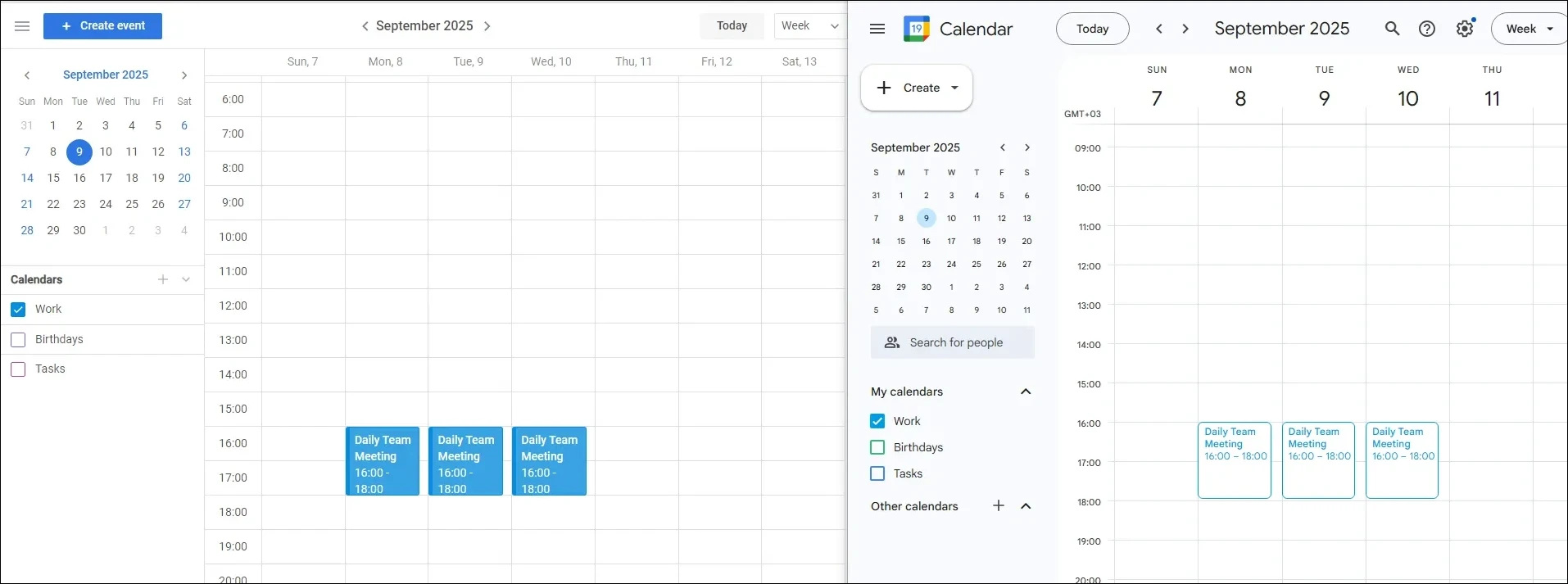DHTMLX Event Calendar is a lightweight JavaScript component that provides a developer-friendly way to build feature-packed event calendars with minimum time and effort. There are plenty of configuration and customization options for adjusting this component to specific project requirements. Also, it is possible to transform our Event Calendar into a single scheduling hub by integrating it with widely used calendars, such as Google Calendar. And our team strives to help you achieve this goal.
Today, we are excited to announce the release of the GitHub demo for Google Calendar integration with DHTMLX Event Calendar. This demo can serve as a foundation that you can build upon or tweak to build a custom, production-ready calendar integration.
Benefits of Integrating DHTMLX JavaScript Event Calendar with Google Calendar
Google Calendar is a major player in the scheduling niche, trusted by companies of all scales to handle their day-to-day activities online. So, it is unsurprising that DHTMLX clients may also rely on Google’s ecosystem for daily planning.

That is why we came up with the idea to vividly demonstrate how to integrate Google Calendar with JavaScript event calendar from DHTMLX. From a practical standpoint, this integration can offer multiple benefits:
- Real-time two-way synchronization of events
Any changes in the JavaScript event calendar (adding, editing, or deleting events) are simultaneously reflected in Google Calendar (and vice versa on reload).
- Centralized scheduling experience
Instead of hopping between five different apps or calendars, end-users can find all planned activities in one place – a unified calendar view. Appointments, personal meetings, negotiations – all put together, so they won’t lose track of things.
- Synced data storage
Synced schedules are stored in Google’s cloud, ensuring improved data safety and accessibility.
- Linking with other tools from the Google Ecosystem
Integrating DHTMLX Event Calendar with Google Calendar can also serve as a gateway to connecting with other Google Workspace tools, such as Gmail or Google Meet.
What is interesting in this integration from the developer’s perspective? Let’s find out.
Technical Aspects of JavaScript Event Calendar Integration with Google Calendar
While building the integration, we set goals to keep it up to date with modern JavaScript, make sure logins are safe, get events syncing smoothly, and facilitate the dev workflow:
- Modern technology stack (Node + Vite stack)
The integration is based on a tried and trusted technology stack. For the backend, we opted for Node.js. On the frontend, Vite was the most attractive choice because it gives quick builds and hot reloading without much setup.
- Secure authentication
Google Calendar API integration provides OAuth 2.0 sign-in with automatic token refresh, handled by Passport-Google-OAuth v3 to ensure secure and reliable access to Google accounts.
- Accurate event mapping
Google Calendar sends data in its own way, so we had to use a server-side mapper. It takes care of the Google Calendar payloads(recurring events, all-day events) and reshapes them intot eh format understandable to DHTMLX Event Calendar.
- Clean architecture
The integration is built with a well-defined, modular architecture, adhering to the separation of concerns (SoC) principle (Express routes → services → mappers). The frontend communicates via a minimalistic REST API. This approach improves the maintainability and scalability of the codebase.
- Smooth developer experience
We used a Monorepo setup with Vite hot-reload for the client-side, the Nodemon CLI utility for the server-side, and a single npm run dev command to start the development server.
In addition to the official release of the integration demo, our team is finalizing the work on a new technical guide that will allow you to repeat this integration path in real-world projects. This guide will include step-by-step instructions on how to set up a JavaScript event calendar and integrate it with Google Calendar. Stay tuned for the upcoming guide release. And don’t forget to download a free 30-day trial version of DHTMLX Event Calendar to try this powerful integration in action.